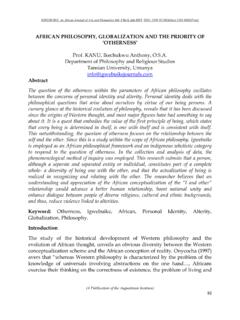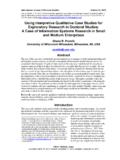Transcription of GOD, DIVINITIES AND ANCESTORS IN AFRICAN …
1 IGWEBUIKE: An AFRICAN Journal of Arts and Humanities Vol. 3 No 4, June 2017. ISSN: 2488-9210(Online) 2504-9038(Print). GOD, DIVINITIES AND ANCESTORS IN AFRICAN TRADITIONAL. RELIGIOUS THOUGHT. Ushe Mike Ushe, Department of Religious Studies National Open University of Nigeria, ` Jabi, Abuja Abstract This paper examines how Africans conceive of the Supreme Being, DIVINITIES and the ANCESTORS . The paper discusses the place of the DIVINITIES and ANCESTORS in AFRICAN religious meta-physics, stressing that their belief in these other spiritual beings do not in any way contradict their belief in the Supreme Being as some western scholars opined. The paper used inter-disciplinary method which involves the use of interview, observations and secondary sources. Data were collected using descriptive analysis to examine the place of Supreme Being, DIVINITIES and ANCESTORS in AFRICAN traditional religious from the research have shown that the concept of Supreme Being is not strange to the Africans but in traditional Africa, there is no atheist.
2 It sees the DIVINITIES as the offspring or apparitional beings who receive their authority from the Supreme Being to serve in the unitary theocratic system of government. The paper sees the ANCESTORS as the intermediaries between the Supreme Being, DIVINITIES and the living. The paper suggests amongst others, the need for proper religious education, a theology of enculturation and understanding of AFRICAN worldviews in other to sustain Africans beliefs and practices in these spiritual beings. Keywords: God, DIVINITIES , ANCESTORS , AFRICAN , Traditional, Religion. Introduction For many decades, the concept of Supreme Being (God), DIVINITIES and ANCESTORS (the living-dead) in AFRICAN traditional religious thought has been a controversial and misunderstood concept. There were many factors which led to this controversy and misconception. These include:lack of written documents, lack of indebt study of AFRICAN religion leading to hasty conclusion, prejudice by western scholars who misconceived AFRICAN traditional religious concept with Christianity and language barriers (Ikenga- Metuh, 1981).
3 Most of the scholars (ethnographers, historians and colonial anthropologists) who came to study the indigenous religion of Africa were armchair scholars who depended on data from missionaries who themselves concentrated in one community or tribe. They used the scanty information derived from one or two localities in Africa to draw conclusion about the ontology of the Supreme Being, DIVINITIES and ANCESTORS (the living-dead) in (A Publication of the Augustinian Institute). 154. IGWEBUIKE: An AFRICAN Journal of Arts and Humanities Vol. 3 No 4, June 2017. ISSN: 2488-9210(Online) 2504-9038(Print). Africa (Mbiti, 1970). These armchair scholars went as far as believing that the sub-saharan Africa is one country with one religious belief and practice. This controversy and misunderstanding misconception continued until the 1970s and 1980s whensome AFRICAN indigenous scholars like Bolaji E.
4 Idowu, Mbiti, S. John set out to refute some of the erroneous claims about AFRICAN traditional religion. They acknowledged the fact that Africans had known God before the missionaries came (Ray, 1976). This view gave Africans and their religion, which was battered and shattered by the missionaries who condemned and denigrated their religion, a new hope and integrity. In this paper, our attention is drown to the place, position and the role of DIVINITIES and ANCESTORS (the living-dead) in AFRICAN traditional religious meta-physics stressing that their belief in these other beings do not in any way contradict Africans belief in the Supreme Being as opined by some western scholars. It should be noted that there are realities in AFRICAN traditional religion which has not been properly echoed by Africans themselves, especially, the Eurocentric ones whose religious inclination has blinded them to the fact that Africans are not strangers to worship of monotheistic God (Supreme Being).
5 Who is called by various names in Africa. In most religions of the world, the concept of Supreme Being is clearly spelt out just as it is in AFRICAN traditional religion where the Supreme Being is conceived as a Supreme King with the DIVINITIES appointed to minister each department in the theocratic government of the world and the ANCESTORS (the living-dead) clearly set forth as intermediaries between the Supreme Being and the living (Mbiti, 1970). God (The Supreme Being)in AFRICAN Traditional Religious Thought Belief in the existence of God (Supreme Being) is fundamental in AFRICAN society. The word God (Supreme Being) refers to the living eternal Being who is the creator and source of all living and whose life existed from the dateless past (Idowu, 1962). God (Supreme Being) is self-existed and an all knowing being whose power sustains the universe and sees all things at the same time without any modern instrument.
6 This Great Being as revealed Himself in many different ways, and human beings have always felt His presence and responded to Him in worship (Brown, 1975). This manifestation or revelation of God (the Supreme Being) has brought about a living relationship between God and mankind, leading to what we now call religion (Mbiti, 1975). Many people, especially the Jews and Muslims who received this revelation have seen God as a Personal Being , while others like the Buddhists, think of God as a Personal Being at all (Idowu, 1962). The (A Publication of the Augustinian Institute). 155. IGWEBUIKE: An AFRICAN Journal of Arts and Humanities Vol. 3 No 4, June 2017. ISSN: 2488-9210(Online) 2504-9038(Print). greatness of God has been described by many scholars, religious people and Holy Books. In describing the Supreme Being, Shorter (1978) states: The Supreme Being (God) is the power, the kingdom, the glory and the majesty, and to him belongs creation and to rule over what He has created.
7 He alone is the Giver of life; He is omniscient for His knowledge encompasses all things. He beholds the thoughts of all mankind and secrets of their hearts, by His knowledge, which was from aforetime. The Arjuma'sHymmin ancient Hindu Gita, written in about 500-100 BC. further expresses the same belief in the greatness of this great God and his relationship with humanity and the universe thus: Why should human beings not worship or venerate you? You are the first creator, infinite; Lord of the gods, home of the Universe. You are the imperishable. You are the last Prop-and-resting Peace of the universe. You are the knower and what is to be known . The whole universe was spunby strength is infinite, Your power is limitless. You bring all things to their fulfillment: hence You are All You are the Father of the world of moving and unmoving things (Brown, 1975:40-56).
8 This description of AFRICAN belief given above shows the extent of the greatness of this Supreme Being by many greatness of the Supreme Being is also portrayed in AFRICAN religion by Mbiti (1975) when he explains: Though the knowledge of God as the Supreme Being is not documented in any sacred book, yet it is expressed in proverbs, short statements, songs, prayers, names, myths, stories and religious ceremonies. The point Mbiti (1975) is making here is that for one to understand the concept of God (the Supreme Being) in Africa, he/she has to study carefully the entirety of the culture of the people. This however, agreed with what Mbiti (1975) said: one should not therefore, expect long dissertations about God. But is no stranger to AFRICAN peoples, and in traditional life there are no atheists . This description of the greatness of the Supreme Being is further supported by an Ashanti proverb which says: No one shows a child the Supreme (A Publication of the Augustinian Institute).
9 156. IGWEBUIKE: An AFRICAN Journal of Arts and Humanities Vol. 3 No 4, June 2017. ISSN: 2488-9210(Online) 2504-9038(Print). Being (Ekeopara, 2005). This proverb indicates that anyone born in AFRICAN does not need to go to school to learn about the existence of the Supreme existence is known by all, including the children. This proverb however, debunked the erroneous conclusion usually drawn on AFRICAN belief in God by the western scholars who argued that the idea of God (the Supreme Being) is foreign to AFRICAN people (P'Bitek, 1970). Parrinder (1974). posited that belief in the existence of the Supreme Being is a common feature of AFRICAN religion; therefore, it is wrong assumption for the western scholars to think that Africans only claim to have the idea of the Supreme Being with the advent of Christianity. There are divergent views of scholars as per the origin of religion and the belief in God in Africa.
10 As per religion some scholars see religion as originating from fear. As people saw the vastness of the universe, the rumblings of thunder, lightning, the sea and so many other things that caused them fear, they developed faith in something that will shield them from what they feared. Others see religion as originating from magic while others see religion as the creation of the priestly class. As there are divergent views of scholars concerning the origin of religion, in the same way many scholars have various views as per the origin of belief in God in Africa. Thus, three important views exist which are here explained. Firstly, through reflections on the nature of the universe, Africans came to believe in God. This view has its bases on the fact that Africans believe in Supreme Being as the Creator of the universe. This belief led them to reflect on the vastness of the universe.







